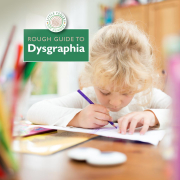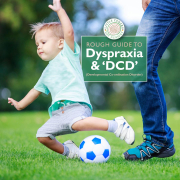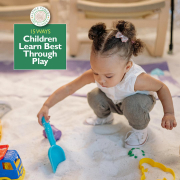10 Ways to Boost Learning Through Play at Home
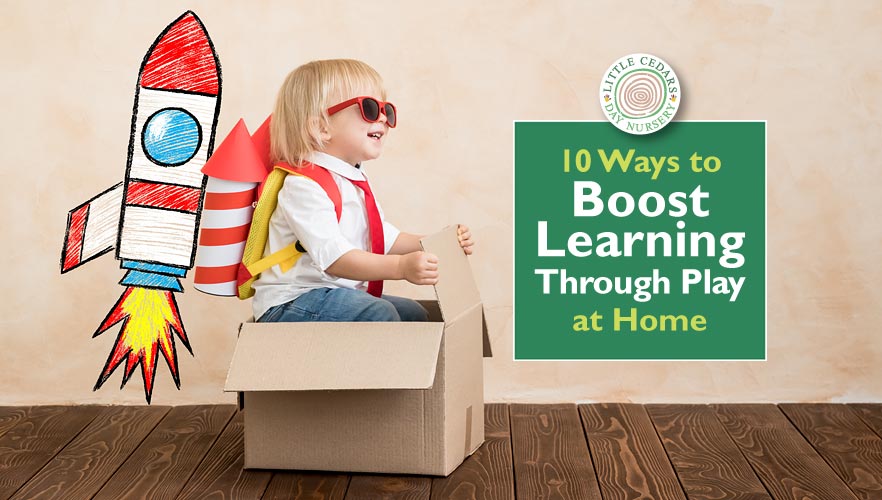
 As we previously reported, children learn and benefit in a huge number of ways when they play. Improvements to motor skills, critical thinking, fitness levels, creativity, social skills and emotional intelligence are just a few known benefits. Indeed, play is accepted to be the very best way for children to learn, particularly in their early years. Furthermore, when play is coupled with a deep parental involvement in a child’s education, the benefits can be truly profound. With all that in mind, we follow up today with 10 easy ways for parents to boost children’s learning through play at home.
As we previously reported, children learn and benefit in a huge number of ways when they play. Improvements to motor skills, critical thinking, fitness levels, creativity, social skills and emotional intelligence are just a few known benefits. Indeed, play is accepted to be the very best way for children to learn, particularly in their early years. Furthermore, when play is coupled with a deep parental involvement in a child’s education, the benefits can be truly profound. With all that in mind, we follow up today with 10 easy ways for parents to boost children’s learning through play at home.
1. Set Aside a Dedicated Play Space at Home
 One of the ways you can optimise the success of any indoor play is to set aside a dedicated and safe play area or room for your child. Here, you can ensure that children have the space and tools available for stimulating play when needed, and quieter play at other times. Age-appropriate toys, books, and equipment are, of course, the first prerequisite for such an area. However, you may also consider other elements such as a quiet storytelling/reading corner, a play den or teepee, a relaxation area with cushions and blankets, a creative section with art and craft supplies, a play kitchen or play tools section, and so on. Giving your child such a space is sure to encourage them to immerse themselves in their play activities. And, as we know, children learn best through play.
One of the ways you can optimise the success of any indoor play is to set aside a dedicated and safe play area or room for your child. Here, you can ensure that children have the space and tools available for stimulating play when needed, and quieter play at other times. Age-appropriate toys, books, and equipment are, of course, the first prerequisite for such an area. However, you may also consider other elements such as a quiet storytelling/reading corner, a play den or teepee, a relaxation area with cushions and blankets, a creative section with art and craft supplies, a play kitchen or play tools section, and so on. Giving your child such a space is sure to encourage them to immerse themselves in their play activities. And, as we know, children learn best through play.
2. Play Proactively & Interactively With Your Child
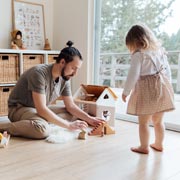 As well as giving children the tools for imaginative and educational play at home, your proactive input will also boost the benefits they receive from such activities. So, get involved, lead them sometimes and at other times let them lead. They’ll discover and learn more in this way. Ask and answer questions, encourage them to be creative in their thinking and physical approach and highlight aspects and elements that they may not otherwise have been aware of. Such an approach can teach children so much. It may well also deepen the bond between you.
As well as giving children the tools for imaginative and educational play at home, your proactive input will also boost the benefits they receive from such activities. So, get involved, lead them sometimes and at other times let them lead. They’ll discover and learn more in this way. Ask and answer questions, encourage them to be creative in their thinking and physical approach and highlight aspects and elements that they may not otherwise have been aware of. Such an approach can teach children so much. It may well also deepen the bond between you.
3. Role-Play Together
 There are many types of play at home that can involve role-play, which is a powerful tool for learning. Role-play allows children to immerse themselves deeply into the game, story, or scenario they are acting out. As such it greatly boosts young imaginations and stimulates creativity skills. So, encourage such activities as dressing up in costumes, acting, and putting on pretend voices to embody characters. You and your child can take this a step further through the setting up of play equipment or props to create a new play scenario, for example, a play den, cave, pretend kitchen, or castle. Children will have immense fun whilst also learning huge amounts from such creative and imaginative activities.
There are many types of play at home that can involve role-play, which is a powerful tool for learning. Role-play allows children to immerse themselves deeply into the game, story, or scenario they are acting out. As such it greatly boosts young imaginations and stimulates creativity skills. So, encourage such activities as dressing up in costumes, acting, and putting on pretend voices to embody characters. You and your child can take this a step further through the setting up of play equipment or props to create a new play scenario, for example, a play den, cave, pretend kitchen, or castle. Children will have immense fun whilst also learning huge amounts from such creative and imaginative activities.
4. Read Interactively Together
 Role-playing can also be brought into time spent reading with your child. Reading with a child is hugely beneficial to them, so reading with them in interactive ways is to be encouraged. Indeed, studies show that reading with a child during their early years boosts language skills by the equivalent of 8 months and, to a significant degree, it can also level the educational playing field for children from lower socio-economic backgrounds. Note that we say read ‘with’ children not ‘to’ them here. Interactively reading with your child is the key here as it engages them more fully so that its benefits can be felt by the child for the long term. So, next time you read with your under-five child, ensure you get them involved and encourage them to immerse themselves in the story or scenario. Let them ask questions or guess what will happen next, and make it fun through role-playing of the characters and suchlike. Reading with children really is worth its weight in gold!
Role-playing can also be brought into time spent reading with your child. Reading with a child is hugely beneficial to them, so reading with them in interactive ways is to be encouraged. Indeed, studies show that reading with a child during their early years boosts language skills by the equivalent of 8 months and, to a significant degree, it can also level the educational playing field for children from lower socio-economic backgrounds. Note that we say read ‘with’ children not ‘to’ them here. Interactively reading with your child is the key here as it engages them more fully so that its benefits can be felt by the child for the long term. So, next time you read with your under-five child, ensure you get them involved and encourage them to immerse themselves in the story or scenario. Let them ask questions or guess what will happen next, and make it fun through role-playing of the characters and suchlike. Reading with children really is worth its weight in gold!
5. Limit Time Spent Using Screens
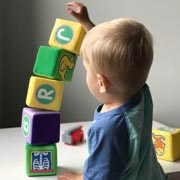 While electronic screens have their occasional place in the education and entertainment of families, it’s healthy to ensure your child has regular screen-free time. Partaking in active play at home — rather than staring inactively at a screen — can only be a good thing, in so many ways. Social skills will be better when children are actively involved in physical play with others. Motor skills and fitness will also benefit. Creativity levels will go through the roof too when children play in real life. They will also learn so much about the world, everything around them and the endless possibilities available to them by playing in the real world. Ensuring children get access to such benefits and opportunities by switching off smartphones, TVs, tablets and game consoles is something every parent can easily do for their child. Doing so will allow for more traditional play, which will enrich their lives in an infinite number of ways.
While electronic screens have their occasional place in the education and entertainment of families, it’s healthy to ensure your child has regular screen-free time. Partaking in active play at home — rather than staring inactively at a screen — can only be a good thing, in so many ways. Social skills will be better when children are actively involved in physical play with others. Motor skills and fitness will also benefit. Creativity levels will go through the roof too when children play in real life. They will also learn so much about the world, everything around them and the endless possibilities available to them by playing in the real world. Ensuring children get access to such benefits and opportunities by switching off smartphones, TVs, tablets and game consoles is something every parent can easily do for their child. Doing so will allow for more traditional play, which will enrich their lives in an infinite number of ways.
6. Use Toys That Allow Open-Ended Play
 Toys that allow open-ended play are the toys that young children will usually learn the most from. For example, allowing your child to play with building blocks and materials for arts and crafts will let your child’s imagination run riot. Through these, they will be able to create an infinite range of scenarios and possibilities. Dolls and action figures are also good examples that will allow children to immerse themselves in open-ended play, with you there to help expand those possibilities, scenarios and learning opportunities even further.
Toys that allow open-ended play are the toys that young children will usually learn the most from. For example, allowing your child to play with building blocks and materials for arts and crafts will let your child’s imagination run riot. Through these, they will be able to create an infinite range of scenarios and possibilities. Dolls and action figures are also good examples that will allow children to immerse themselves in open-ended play, with you there to help expand those possibilities, scenarios and learning opportunities even further.
7. Allow Your Child to Take the Lead
The avoidance of over-structured games and play scenarios will also allow your child to take the lead. Children learn in different ways and at different paces to each other, so allowing them to guide the direction of play will also allow them to play and learn at their own unique pace. It will also allow them to tailor their play to their own particular interests, which will also ensure their engagement is optimised. Your involvement, however, can help your child avoid missed learning opportunities and perhaps some scenarios that they may not have thought of themselves, so it’s a fine balance.
8. Facilitate Social Play
 It doesn’t have to be just you and your child playing. Siblings and your child’s peers can also be encouraged to join in. Consider inviting your little one’s friends to your home or local park for a play date. Getting your child’s friends and peers together for group play will allow your child to learn and hone social skills like cooperation, teamwork, leadership, sharing and potentially even conflict resolution. And, with you there to oversee the group session, you can be sure that home play will be fulfilling, organised, fair and rewarding for all who take part.
It doesn’t have to be just you and your child playing. Siblings and your child’s peers can also be encouraged to join in. Consider inviting your little one’s friends to your home or local park for a play date. Getting your child’s friends and peers together for group play will allow your child to learn and hone social skills like cooperation, teamwork, leadership, sharing and potentially even conflict resolution. And, with you there to oversee the group session, you can be sure that home play will be fulfilling, organised, fair and rewarding for all who take part.
9. Encourage Outdoor Play Too
 Remember that you can facilitate learning through play outdoors with your child too. Whether in the garden, park or countryside, playing outdoors gives children a vast number of learning opportunities — and it’s great fun! By accompanying children outdoors, they can naturally explore and discover — and enjoy doing so in ways that are much more free than when playing indoors. Outdoor play is a feast for the senses, it will encourage the honing of physical skills like balance, coordination, motor skills and strength as well as fitness. Playing in the natural world is also incredibly good for children’s mental well-being and holistic development. Learn more about the benefits of outdoor play and the importance of nature to children by following the bold links.
Remember that you can facilitate learning through play outdoors with your child too. Whether in the garden, park or countryside, playing outdoors gives children a vast number of learning opportunities — and it’s great fun! By accompanying children outdoors, they can naturally explore and discover — and enjoy doing so in ways that are much more free than when playing indoors. Outdoor play is a feast for the senses, it will encourage the honing of physical skills like balance, coordination, motor skills and strength as well as fitness. Playing in the natural world is also incredibly good for children’s mental well-being and holistic development. Learn more about the benefits of outdoor play and the importance of nature to children by following the bold links.
10. Celebrate Your Child’s Achievements Together
Use the power of positive reinforcement to take your child’s enjoyment of home play to the next level. Giving positive feedback to your child when they accomplish a task or achieve something new will greatly encourage them. It’ll give them a sense of achievement, boost confidence, and let them know they’re doing well and are on the right path. What’s more, it’ll encourage them to play to learn more.
Little Cedars Nursery, Streatham
A High-Quality Nursery & Preschool in Streatham, near Tooting, Furzedown, Balham, Norbury & Colliers Wood


The concepts above are, of course, also the types of approaches we use at Little Cedars to boost the learning of children under five in our childcare setting. We are a high-quality nursery and preschool in Streatham in South West London, near Streatham Hill, Streatham Park, Streatham Common, Furzedown, Tooting, Tooting Common, Tooting Bec, Tooting Broadway, Balham, Norbury and Colliers Wood. We also support many of the Government-funded free childcare schemes and are rated as a Good Provider by Ofsted.
Contact us today to explore a possible nursery/preschool place for your child at Little Cedars Nursery, Streatham:


